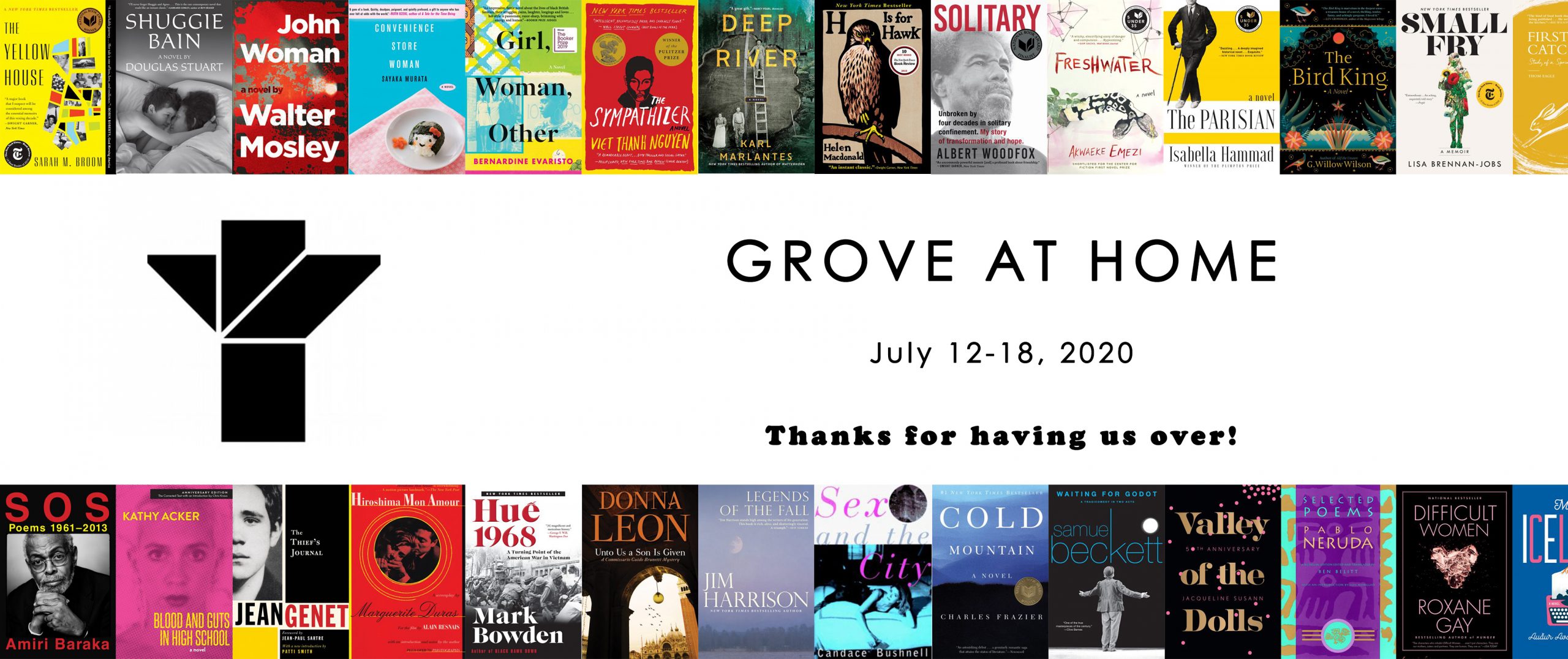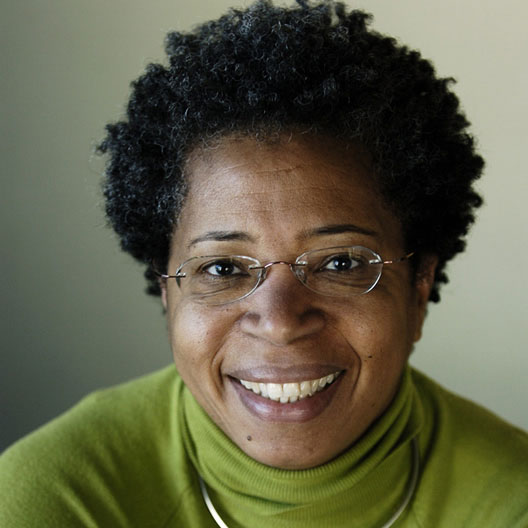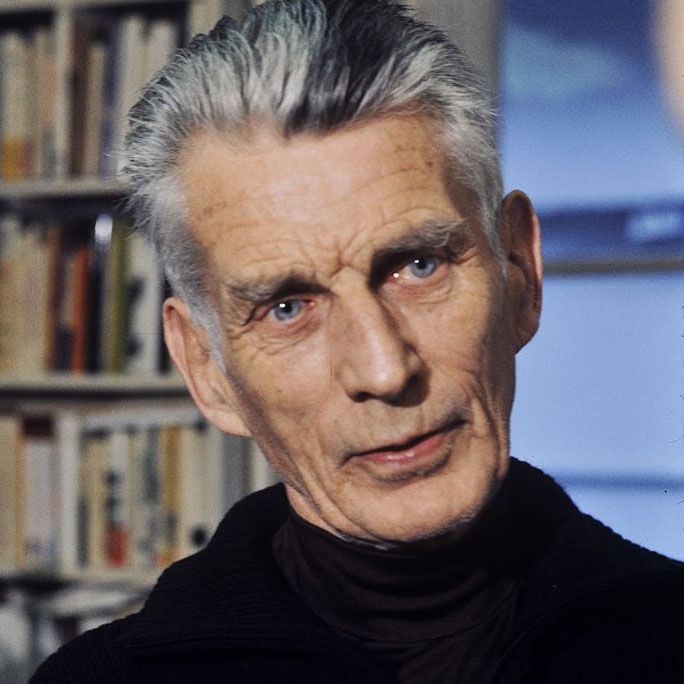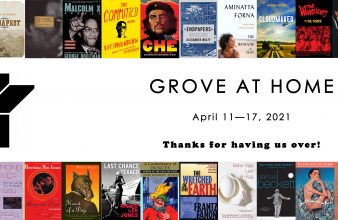News Room
Welcome to Grove at Home!
Every weekday, from now until we’re all out of the house again, we’ll be sharing a couple of links — some fresh, some from the vault — to say hi, remind you to keep reading, and let you know what’s on our minds.
Friday, July 17
It’s Mark Bowden’s birthday! Bowden’s one of America’s most prominent and respected journalists, and among his many books are some of the most popular works of nonfiction ever published, including Black Hawk Down, Hue 1968, Killing Pablo, and Worm. Just last week, we had the pleasure of publishing his latest, The Case of the Vanishing Blonde and Other True Crime Stories, which Publishers Weekly in a starred review called “engrossing.” Since we can’t, for the moment, share some cake with him in person, we’re simulating his presence by watching this excellent talk he gave at San Francisco’s Commonwealth Club back in 2011, shortly after the publication of Worm, his account of 2008’s astonishing Conficker computer worm — which proliferated across systems with a speed that astonished and terrified experts. Bowden also talks about how he became a science correspondent early in his career (hint: it had nothing to do with knowledge of science), the utopian thinking that gave rise to the internet, and much more. Happy birthday to one of the greats!
Kelli Jo Ford on the books that made her acclaimed debut, Crooked Hallelujah, possible
This week, we had the extreme honor of publishing Crooked Hallelujah, the first novel by Plimpton Prize winner Kelli Jo Ford. The book — a debut Dwight Garner promptly declared “more than promising” in the New York Times — focuses on characters who, like Ford and her family, are strong women from the Cherokee Nation of Oklahoma. Today, in LitHub, Ford writes about the books she turned to, while she was writing, to make her own debut possible. As will surprise no one who’s had the pleasure of encountering Ford’s prose, it’s a joy to read.
“The characters and their hometowns kept coming. So I wrote them. I tried to understand what their stories were in one particular moment in time: where they started, where they ended up, what they cared about along the way. Like any writer, I turned to books as teachers.” Continue reading…
Interslavic: The invented language coming soon to a theater near you (OK, a “theater” near you)
Few novels ever attain the legendary status of Jerzy Kosinski’s 1965 classic The Painted Bird. Reviewing it in the New York Times on its release, Nobel laureate Elie Wiesel praised the book’s “shattering eloquence,” its “deep sincerity and sensitivity.” For his brand-new film adaptation of the novel, Czech director Václav Marhoul faced a quandary. The novel, written in English, takes place in a setting pointedly devoid of national markers; Kosinski was born in Poland, and the book’s action takes us wandering across a network of Eastern European villages. We never learn what country we’re in, or even what language the characters are speaking. So how to preserve this indeterminacy while filming characters who must, in the end, speak some actual language? Marhoul found a solution: He shot the movie in Interslavic, an artificial language created in the early twenty-first century as hybrid of Slavic languages — the group that includes Russian, Polish, Czech, Serbo-Croatian, and more — designed for maximal intelligibility by those who speak any of them. (In Interslavic — which, like some other Slavic languages, can be written in either the Cyrillic alphabet (used by Russian) or the Latin alphabet (used by both Polish and English), the language is called “Medžuslovjansky” or “Меджусловјанскы.”) The Painted Bird is the first movie ever made in Interslavic, and speakers of Slavic languages may be surprised how readily they’re able to comprehend the invented tongue. Here’s a short explanatory video, produced by Radio Free Europe:
Thursday, July 16
Marceline Loridan-Ivens: “Mankind is far away from having learned a lesson from the last century”
Today marks France’s Holocaust Memorial Day — it’s the seventy-eighth anniversary of the Vel’ d’Hiv’ Roundup, in which French police arrested more than 13,000 Parisian Jews and deported them to camps to be detained and murdered. In light of this devastating commemoration, we take hope from the example of Marceline Loridan-Ivens — a heroic Jewish veteran of the French Resistance, Auschwitz survivor, lifelong opponent of fascism and the kinds of historical forgetting that enable it, and prodigious artist whose work included numerous films and the indispensable memoir But You Did Not Come Back. To get a sense of this indomitable human being, try watching this short trailer for filmmaker Cordelia Dvorák’s “Marceline. A Woman. A Century,” which features wondrous footage of Loridan-Ivens shot not long before her death, in late 2018, at the age of ninety.
Dionne Brand: “I’ve developed an aversion to that word normal”
As so many of us dream of “returning to normal,” the Trinidad-born Canadian poet and intellectual Dionne Brand has written a stunning rebuke of some of the ideas of “normalcy” that may be implicit in those dreams. In a stunning piece for the Toronto Star — the paper of the city as whose poet laureate Brand has served — she weighs in trenchantly on neoliberalism, race, policing, and tremendously much more. A vital read, whatever country it finds you in.
“Was the violence against women normal? Was the anti-Black and anti-Indigenous racism normal? Was white supremacy normal? Was the homelessness growing on the streets normal? Were homophobia and transphobia normal? Were pervasive surveillance and policing of Black and Indigenous and people of colour normal? Yes, I suppose all of that was normal. But, I and many other people hate that normal.” Continue reading…
Isabella Hammad on reflections of class struggle in Palestinian embroidery, interrogating nostalgia, and her acclaimed debut novel The Parisian
Late last year, some months after the publication of her acclaimed, Palestine Book Award-winning debut novel The Parisian, British author Isabella Hammad traveled to Denmark for the Louisiana Literature Festival (no, Americans, not that Louisiana), where she sat down with Kathrine Tschemerinsky for a brief interview, in which she touched on a number of fascinating subjects: the book that has catapulted her to global literary attention, the culture of Mandate-era Palestine, and the difficulties in writing from the perspective of another, of which Hammad says, “You use your emotional experience, you use your literal experience, you use your experience of others to access imaginatively another subjectivity.”
Wednesday, July 15
I,I,I,I,I,I, Kathy [Acker]
From May through August of last year, London’s Institute of Contemporary Art went Full Kathy with “I,I,I,I,I,I, Kathy Acker,” the art exhibition in the UK dedicated to the work of the salty, swaggering, brilliant embodiment of literary postmodernism known as Kathy Acker. This short film from the exhibition, made by Amy Gwatkin and posted online by the digital video channel Nowness, features several of the artists who contributed to that exhibition — including the likes of Bhanu Kapil and Carl Gent. It’s not to be missed.
Beckett and failure: “Always writing his own dispossession”
On the first day of this year, scholar Eva Kenny published a wonderful rumination Samuel Beckett, failure, and much more. In more recent weeks, the academic and activist Cornel West has deployed Beckett’s famous dictum, from 1983’s Worstward Ho, to “Try again. Fail again. Fail better.” as an inspiration to the global movement for Black lives, calling it “the blues line of our Irish brother.” Kenny explores the phrase in a more porous way, finding in Beckett’s later work “a set of ideas around the failure and endurance of language that had been sanded down to a state of prehistoric refinement over thirty years” — and applying a Beckettian logic of failure to an analysis of the likes of Donald Trump and Boris Johnson. Extremely worth a read.
“In midsummer 2016, as I drew ever closer to finishing a long doctoral dissertation on Samuel Beckett, I described to a friend’s boyfriend my alarm at the trend towards portraying a popular, uplifting Beckett that I kept reading about in the New York Times weekend supplement. I was worried I would have to change my topic. The lines that appeared again and again, everywhere, as if in a nightmare, are: ‘Ever tried. Ever failed. No matter. Try again. Fail again. Fail better.’ Taken from the first page of Beckett’s late prose work Worstward Ho, the phrase was, for a while, Silicon Valley’s mantra, along with ‘Move fast and break things.’” Continue reading…
Lauren Acampora moved back to the suburbs, and didn’t regret it
Before her electrifying debut novel The Paper Wasp, praised by the New York Times, O Magazine, Elle, Town & Country, Tatler, Thrillist, BBC.com, Literary Hub, and Publishers Weekly, Lauren Acampora won widespread admiration for her first book, the short story collection The Wonder Garden, which we had the delight of publishing in 2015. At the time, she invited us over, to talk about her life and her move back to the suburbs, meet her artist husband (who created the book’s cover), and discuss the fascinations that lie just beneath the surface of the everyday. Check it out!
Tuesday, July 14
The Marquis de Sade wishes you a painfully happy Bastille Day!
Today is, of course, Bastille Day, France’s national holiday, which commemorates the storming by revolutionary forces of the Bastille, Paris’s legendary prison. It’s hard to think of a better day to appreciate the tremendous, inordinately complex legacy of perhaps the Bastille’s most famous resident: Donatien Alphonse François, better known by his noble title, the Marquis de Sade, who spent a decade of his life confined there. There’s not a lot that can be quickly or easily understood about the Marquis’s notorious work, which has been both celebrated and decried for centuries, but this short video is a pretty good place to start!
Lit Hub’s editors are like you: They are eagerly anticipating the rest of the year’s books
As of today, 2020 is 53.4% over. Before we can round it out and unanimously agree that this year has been… not easy, we have, thankfully, a lot of reading to do. Over at Literary Hub today, editors are listing the forthcoming books they’re most excited about, and it’s utterly fantastic. While all the many books listed look frankly terrific, you can’t blame us for being especially excited for a few in particular: Helen Macdonald’s Vesper Flights (coming in August!); Sayaka Murata’s Earthlings, translated by Ginny Tapley Takemori (October!); Xiaolu Guo’s A Lover’s Discourse (also October!); and Megan Hunter’s The Harpy (November).
“Though it may feel like 2020 has been going on for a year already, or five years, or a century, I regret to inform you that we’re only halfway through it. On the other hand: we’re halfway through 2020. In fact, by the time this goes live, we will be slightly more than halfway through 2020. Which is something, I suppose.” Continue reading…
Roam Some Palaces of Reason and Delight with John Julius Norwich
Alas, we were unable to find any great video footage of the legendary John Julius Norwich, author of A History of France among many other books, discussing the storming of the Bastille 231 years ago today. But Norwich was wonderful on every subject, and so today we’re instead watching him in this fantastic, long-forgotten episode of “Treasure Houses of Britain.” Norwich is his usual self — understated, witty, phenomenally erudite — and it’s a joy to see him sitting comfortably at Hugh Walpole’s desk, waxing eloquent before a Leonardo painting, gliding among well-appointed rooms full of riveting historical detail and welcome flights of imagination.
https://www.youtube.com/watch?v=YoOsrj7FCNk
Monday, July 13
Jamie Quatro reads from Fire Sermon at Politics and Prose
In 2018, author Jamie Quatro traveled to Washington, DC — her first visit to the capital since a childhood sojourn concerned mostly with astronaut ice cream and attempts to spot first daughter Amy Carter — to read from Fire Sermon, her searing debut novel, named a New York Times Editors’ Choice, a Book of the Year at Literary Hub, the San Francisco Chronicle, and the Times Literary Supplement, and an Indie Next pick, among other honors. If you’ve been staying at home, missing the thrill of live literary readings, this video of the event may be just what the doctor ordered. (As to whether young Quatro’s presence in DC had any effect on Carter’s subsequent bookselling career… the answer is unclear.)
“Life’s frightening pits and contradictions”: Amiri Baraka at the Poetry Project
In 1987, the colossally influential American poet Amiri Baraka gave an astounding, nearly half-hour-long reading at the Poetry Project at St. Mark’s Church, in Manhattan’s East Village, part of celebrations for the twentieth anniversary of that institution, without which New York contemporary poetry scene is all but unimaginable. The recording finds Baraka at the height of his powers, surrounded by admiring colleagues, reading vital new work. It’s extremely worth a listen — and you can give it one right here:
“Do you want to play questions?”
Last week marked the eighty-third birthday of Tom Stoppard, one of our absolute favorites and easily a contender for the title of world’s greatest living playwright. It’s impossible to pick a favorite scene from Stoppard’s remarkable oeuvre, but here, by way of celebration (and to remind you how absolutely marvelous it is) is a scene from Stoppard’s own film of Rosencratz and Guildenstern are Dead, the 1966 play that catapulted him to international renown. In the title roles are Gary Oldman and Tim Roth, respectively. This is just wonderful.











